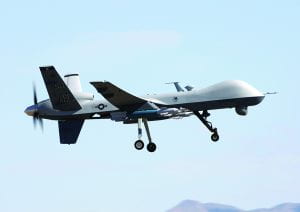BY NICOLE POTTINGER – STAFF WRITER
On February 17, 2015, the United States announced it would allow the export of armed military drones to allied countries, following in the footsteps of China. The State Department said that only certain governments with specific requirements would be allowed to buy military drone technology. This technology is useful for fighting terrorism internationally and domestically, as well as other domestic purposes, such as self-defense. American administrators believe that these new policies will allow the United States to cooperate with other nations as globalization becomes more and more inevitable. A few of the states that are eligible to purchase the military drone technology include Israel, Egypt, and a few of the eastern European countries that recently voiced concerns over Russian aggression.
Many consider this policy change to be controversial given the debate over drones in military zones. Drones became exceedingly popular on the battlefield, giving troops the benefit of having an “eye in the sky” without endangering a pilot. However, letting the technology proliferate and possibly fall into the hands of those we are fighting against is a major reason why selling the military drone technology is so controversial.
The policy is not only controversial on a national scale; but on this campus for a variety of reasons. These reasons include the question of why exactly the United States finally allowed the sale of military drones to other countries. “The export of armed military drones is no doubt designed to fortify the military capabilities of [United States] allies against threats that seem mercurial, like transnational extremist organizations,” Assistant Professor of International Studies Dr. Robert Bosco said.

Assistant Professor of Politics Dr. Benjamin Knoll explained this issue from a domestic policy point of view. “From what I can tell, this was a decision made after a long bureaucratic internal review process by the State Department. As I understand it, the United States has sold military equipment to other countries for many years. It seems that the sale of military drones was somewhat inevitable,” Dr. Knoll said.
While the sale of military drones might seem inevitable, it does not change the fact that there are major global changes ahead of us. It opens a lot of doors that have yet to be unexplored. “One absurd aspect of this is that the United States will sell the armed drones as long as our Allies pinky swear they won’t use them to violate human rights, international humanitarian law, or other nefarious purposes. That, to me, is a joke. It’s also hypocritical: we use them for those purposes, so why can’t they?” Dr. Bosco said.
Students had other opinions of military drones, especially in terms of actual combat, another previously unopened door in international politics. “I think [the sale of military drones] is kind of going along with the global trend of de-humanizing warfare. Taking people out of combat and putting machines in place, which sounds nice because as a U.S. Citizen, I think it’s great because it’s taking humans off of the frontlines, but at the same time, it alienates us from the tragedies of war and violence,” junior and International Studies major Evan Baylor said. Baylor did concur that while taking humans off of the frontlines is a positive, there is no doubt controversy behind why we are able to spare humans from combat. “I think any time you share military technology it is controversial. Of course we have allies, but we don’t want technology like that to get into the wrong hands,” Baylor said.
Junior Lula Amanuel believes in the positivity in drones, regardless of the circumstances. While she believes that drones should not be used for police matters, “Depending on the situation, I think positively on drones, if the situation [for their use] is necessary. Regardless, a life gone is always a negative thought in my mind,” Amaunel said.
Regardless of the varying opinions, we must now pay attention to the new global issues that lie in the wake of this new policy.
